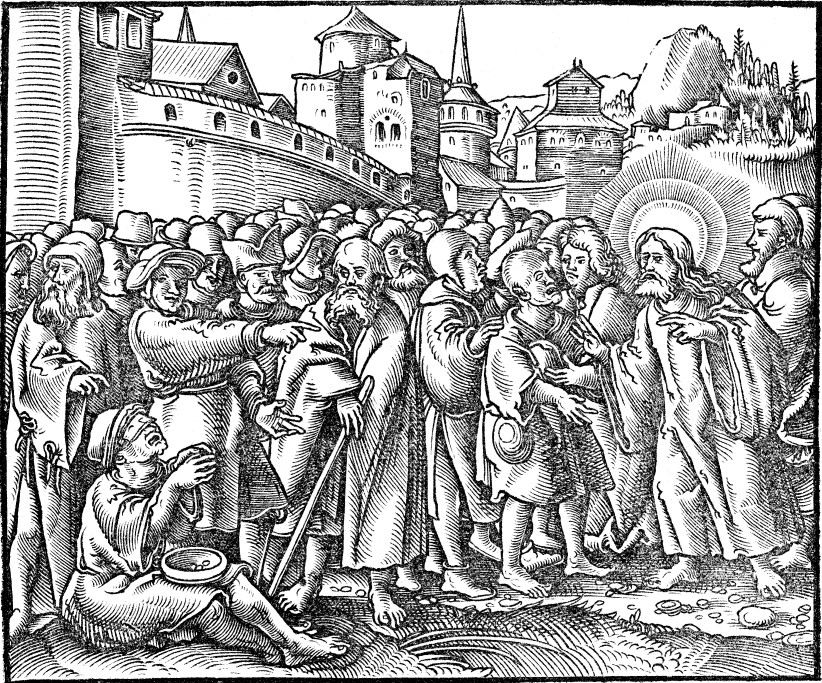
Lessons: 1 Samuel 16:1-13, 1 Corinthians 13:1-13, Luke 18:31-43
Hymns: LSB 545, 708, 556, 602, 797, 417
Grace, mercy, and peace to you from God our Father and our Lord and Savior, Jesus Christ. Amen.
Jesus had set His sights on Jerusalem. He was going there to serve as the sacrificial Lamb to take away the sins of the world. He knew His purpose. He knew why He was sent from His heavenly Father. Now that time is getting close.
For a third time, Jesus tells the disciples what is about to happen. Any Sunday School child can tell you about it. They know well that Jesus went to Jerusalem to die on the cross. They also know well that Jesus did not remain dead but rose bodily on the third day.
As we teach our children these glorious truths, we are tempted to sanitize the account. We don’t often go into much detail about what Jesus endured leading up to His death. We sometimes talk about the pain suffered by those being crucified. And what we don’t see is how harsh it was for Jesus to be forsaken by God the Father for bearing sin of the world.
Jesus told His disciples what He must endure, declaring, “See, we are going up to Jerusalem, and everything that is written about the Son of Man by the prophets will be accomplished. For he will be delivered over to the Gentiles and will be mocked and shamefully treated and spit upon. And after flogging him, they will kill him, and on the third day he will rise” (Luke 18:31-33). Jesus was betrayed by His own, He was put on a false trial, and He was beaten and mocked in horrific ways, demonstrating the debased nature of the human mind. After He was bloodied to a pulp, He was forced to carry His cross, was nailed to that cross, lifted up, and they continued to mock Him. When Jesus died, they sealed up the tomb as good as they could to prevent anyone from staging a resurrection.
Good thing we are more enlightened than those backward thinkers, right? Good thing we have a stronger moral compass than those blood-thirsty savages of the first century, right? Then why do false witnesses still lie in court? Why do children still bully other children? Why do fights break out on playgrounds and war among countries? Why do people think the solution to solving their woes is through death? Why are surgeons so ready to permanently disfigure our children under the guise of “age-appropriate gender-affirming” procedures? Why has it become so sacred for a woman to have the right to abort her babies, killing the highest blessings God offers in this life? Why do we think athletes getting drunk in front of children should be excused for having a good time?
On these matters, we have the clarity of Scripture. God teaches clearly what is right and wrong. Our trouble is that we do not want to listen. We figure the enlightenment of our age—the world’s wisdom—offers greater insight and understanding than God. On some matters, we think that we understand things better than any generation that has gone before us, as we redefine marriage, wink at fornication, and turn the Divine Service into our plaything, butchering the liturgy and incorporating the latest technological trends into what should be God’s sanctuary. We then have to ask, are we really any less arrogant than those who boldly shouted, “Crucify Him! Crucify Him!”?
Or, perhaps, many are like the disciples. In today’s Gospel, St. Luke reports that they did not understand Jesus when He spoke of what is about to happen to Him. This was so, even though Jesus very clearly predicted His passion and resurrection—even though these things were prophesied in the Old Testament—even though this is why God promised to send His only begotten Son after Adam sinned.
And that gets us to our main point: grace is not easily understood. Two weeks ago, we learned that grace is undeserved when we heard the Parable of the Workers in the Vineyard. Last week we learned that grace is passively received as we heard the Parable of the Sower. Now today, we learn that grace is not easily understood.
To consider this, let’s first remember what grace is. Grace is God’s favor toward us, which is undeserved. Despite our sin and rebellion, God loves us and keeps us as the apple of His eye. He sent His Son to pay for our sins, so that we can be reconciled to God our Father. We don’t deserve this gift of salvation, but He grants it to us anyway. It is by grace when Jesus is presented before us through the proclamation of the Word and the administration of the sacraments. It is by grace when we hear that we sinners are forgiven, adopted into God’s family by Baptism, loved by Christ, and covered with Christ’s very righteousness. It is by grace that, though our sins are like scarlet, they shall be as white as snow. It is by grace that God has removed our sin from us as far as the east is from the west. It is by grace that God has worked faith in us through His Spirit so that we believe in Jesus.
People commonly misunderstand grace because either they don’t want anything given for free or they don’t think they need it. Many wrongly think they can earn their way into Heaven.
We have to recognize that the Bible itself is clear. It is my prayer that you will see that as you read the Gospels or the Epistles during Lent this year. After all, the Holy Spirit is the clearest author in the history of the world. We cannot blame God or the Bible when Christians disagree on interpretation. Instead, we must recognize that the fault lies with those who will not hear what the Scriptures are truly saying. When we find portions of Scripture to be unclear, we need to study its context and examine parallel passages that shed more light on the topic. This requires more than a casual reading. It also requires submission to the Word. We cannot declare clear passages like “[God] hates all evildoers” (Psalm 5:5) as unclear just because we may not like what it says. Instead, we recognize it as a true statement of the Law, but through Christ, we are no longer considered evildoers, but workers of righteousness.
Jesus’ words were clear when He told them of His passion for the third time. As I already said, any Sunday School child can understand it. Yet, what Jesus said what understood by none of His disciples at that time. Why not? Obviously, they were sinners. Also, they probably grew up with false views concerning what the Messiah should do, for most expected an earthly king. Next, they just couldn’t grasp the thought of Jesus suffering in that way, for they knew His innocence and they loved Him deeply. Finally, it was God’s will, for the Holy Spirit chose to give them clarity after Jesus rose from the dead.
In the same way, clarity of understanding God’s Word does not come about through our own abilities. It is granted by the Holy Spirit. The more we are in the Word, the more we understand it. The more we hear it expounded, the greater clarity we have, for God the Holy Spirit works through His Word.
As we read, mark, learn, and inwardly digest the Word, by God’s grace our wisdom and understand increases. So does the strength to withstand the various assaults against God’s Word. The world mocks the Word. Our flesh recoils at some of its teachings. Satan seeks to bring doubt into our hearts, as he did with Eve in the Garden.
It is easy to be led astray by these temptations, first by figuring the Word must not be clear and then seeking clarity outside of God’s Word. Then we conclude the Scriptures must have it wrong. And the next thing we know, we depart from the Christian faith.
Instead of giving in to these temptations, let’s be like the blind man (which Mark 10:46 identifies as Bartimaeus). Despite his inability to see, he could see Jesus through the eyes of faith. When he learned Jesus of Nazareth was passing by, he cried out, “Jesus, Son of David, have mercy on me!” How did he know Jesus is the Son of David? How did he know Jesus could have mercy? He believed. It was taught to him. When the crowds rebuked him, trying to silence him because they thought he was a bother to Jesus, Bartimaeus cried out all the more, saying, “Son of David, have mercy on me!” He refused to let anything separate himself from His Savior. That’s faith! He not only had some head knowledge about Jesus, but blind Bartimaeus trusted firmly in Jesus.
When our trust in Jesus is as great as the blind man’s, we don’t worry about what others will think about our faith. We won’t let them silence us. We won’t put our head down and try to blend in with the crowd. We will gladly be that “noisy one” crying out to Jesus.
The conventional wisdom of our age is to refrain from talking about the Christian faith, especially in public. Don’t bring it up at work, for one could lose his job. Don’t bring it up at public school since God has been removed from them. Don’t bring it up among friends because it may reveal divisions.
Bartimaeus, on the other hand, leads us by example. Instead of listening to those who told him to keep his mouth shut, he opened it even more. For he knew that Jesus offers something no one else could give. While he was praying to gain his sight, Jesus not only granted that, but imparted to him saving faith. Jesus declared to him, “Your faith saves you.” And the Bartimaeus followed Jesus, glorifying God. All by grace!
This same Savior has come into your midst. He has the same compassion on you. He forgives you. And, just as Jesus rose bodily from the grave, He promises to you that you, too, shall rise bodily on the Last Day, and will dwell with Him to all eternity. Heaven awaits you, for Jesus paid for your sins and He lives. Thanks be to God! Amen.
The peace of God which passes all understanding keep your hearts and minds in Christ Jesus to life everlasting. Amen

